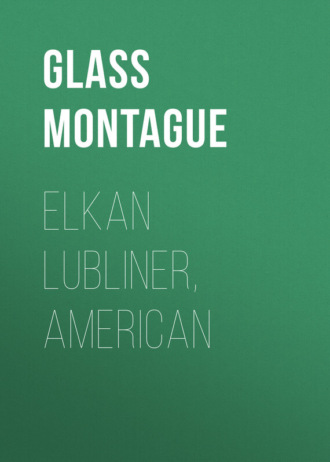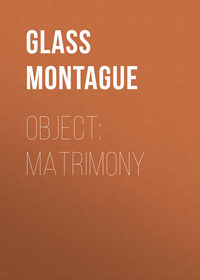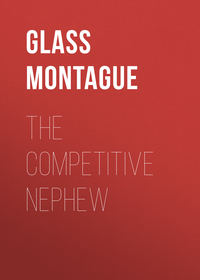 полная версия
полная версияElkan Lubliner, American
"Gan-éden!" he declared as he reached across the table and shook hands with Mrs. Lesengeld.
"Mrs. Lesengeld," he said, "my mother olav hasholom was a good cook, understand me, aber you are a good cook, Mrs. Lesengeld, and that's all there is to it."
Forthwith he resumed his knife and fork, and with only two pauses for the necessary replenishments, he polished off three platefuls of the fish, after which he heaved a great sigh of contentment, and as a prelude to conversation he lit one of B. Gans' choicest cigars.
"There's some dessert coming," Mrs. Lesengeld said.
"Dessert after this, Mrs. Lesengeld," he replied, through clouds of contented smoke, "would be a sacrilege, ain't it?"
"That's something I couldn't make at all," Mrs. Lesengeld admitted. "All I got it here is some frimsel kugel."
"Frimsel kugel!" Scharley exclaimed, laying down his cigar. "Why ain't you told me that before?"
A quarter of an hour later he again lighted his cigar, and this time he settled back in his campstool for conversation, while Mrs. Lesengeld busied herself about the oil stove. Instantly, however, he straightened up as another and more delicious odour assailed his nostrils, for Mrs. Lesengeld made coffee by a mysterious process, that conserved in the flavour of the decoction the delicious fragrance of the freshly ground bean.
"And are you staying down here with Mrs. Lesengeld?" Scharley asked Yetta after he had finished his third cup.
"In this little place here?" Mrs. Lesengeld cried indignantly. "Well, I should say not. She's stopping at the Salisbury, ain't you, Yetta?"
Yetta nodded and sighed.
"It ain't so comfortable as here," she said.
"I bet yer," Scharley added fervently. "I am stopping there too, and them Chinese Lantern Dinners which they are putting up!"
He waved his hand eloquently.
"Poison ain't no word for it, Missus Er – " he concluded lamely as he tried to remember Yetta's name, which after so much soup, fish and coffee had completely escaped him.
"Lubliner," Yetta said. "I guess you know my husband, Mr. Scharley, Elkan Lubliner of Polatkin, Scheikowitz & Company."
Scharley struck the table with his open hand.
"Zoitenly, I do," he cried. "Why, he is the feller which Sol Klinger is telling me about."
Yetta coloured slightly and bit her lips.
"What did he tell you about him?" she asked.
"Why," Scharley said, drawing vigorously on his imagination, "he says to me what a bright young feller he is and – "
Here he reflected that in a highly competitive trade like the cloak and suit business this statement sounded a trifle exaggerated.
"And," he went on hurriedly, "he told me how he saw you and him with Mrs. Lesengeld up at the hotel the other evening, and I says, 'What,' I says, 'you don't mean Mrs. Lesengeld whose husband used to was in the pants business?' and he said he didn't know, 'because,' I says, 'if that's the same party,' I says, 'I would like for her to come up to the hotel and take dinner with me some time,' I says."
He smiled cordially at Mrs. Lesengeld.
"And I hope you will," he concluded earnestly, "to-morrow night sure."
Mrs. Lesengeld shook her head.
"I ain't fixed to go to no swell hotel," she demurred. "I ain't got no clothes nor nothing."
"What do you care about clothes, Mrs. Lesengeld?" Scharley protested.
"And besides," Yetta said with sudden inspiration, "we could get up a little chafing-dish dinner in our room, ain't it?"
"For that matter we could do it in my room," Scharley cried, as there sounded a vigorous knocking on the outside of the door leading to the veranda, and a moment later Williams entered.
"Excuse me, Mr. Scharley," he said, "but I have to be getting back to the hotel and if you're quite through we'll go and look at that map of the lots down in the office."
Scharley waved his hand airily.
"Sit down, Mr. Williams," he said, "and drink the cup of coffee of your life."
He handed the room clerk a cigar.
"I could promise you one thing, Mr. Williams," he went on, "I got a great idee of buying some lots here and building a little house on 'em, gemütlich just like this, and if I do, Williams, I would take them lots from you for certain sure. Only one thing, Williams, I want you to do me for a favour."
He paused and puffed carefully on his cigar.
"I want you to pick me out a couple good vacant rooms on the top floor of the Salisbury for Saturday night," he said, "where I could give a shaving-dish party, so if any of the guests of the hotel objects, understand me, they wouldn't get the smell of the Bortch, coffee, and brown stewed fish sweet and sour."
On the following Wednesday afternoon Elkan sat at his desk, while Marcus Polatkin and Philip Scheikowitz leaned over his left shoulder and right shoulder respectively, and watched carefully the result of a pencilled addition which Elkan was making.
"With them crêpe meteors," Elkan said at last, "Scharley's order comes to four thousand three hundred dollars."
Polatkin and Scheikowitz nodded in unison.
"It ain't bad for a start," Scheikowitz volunteered as he sat down and lit a cigar.
"For a finish, neither," Polatkin added, "so far as that's concerned."
Elkan wheeled round in his chair and grinned delightedly.
"And you ought to seen Sol Klinger when we walked into the Hanging Gardens," he said. "He got white like a sheet. It tickled Scharley to death, and he went right to work and put his arm through Mrs. Lesengeld's arm and took her right down to the middle table, like she would be a queen already."
"Sure," Scheikowitz agreed, "what does a real merchant like Scharley care if she would wear a sheitel oder not, so long as she is a lady already."
Elkan's grin spread until it threatened to engulf his ears.
"She didn't wear no sheitel," he said.
"What!" Scheikowitz cried. "I didn't think a religious woman like Mrs. Lesengeld would take off her sheitel at her time of life."
"What d'ye mean her time of life?" Elkan cried indignantly. "Friday afternoon yet before Yetta went home from her place there at Bognor Park, Mrs. Lesengeld says to her that a widder don't got to wear no sheitel if she don't want to, which if you think, Mr. Scheikowitz, that fifty-three is a time of life, understand me, I think differencely, especially when I seen her with her hair all fixed up on Saturday night."
"Who fixed it?" Marcus Polatkin asked, and Elkan grinned again.
"Who d'ye suppose?" he replied. "Why, her and Yetta spent pretty near an hour up in our room before they got through, and I tell yer with the way they turned up the hem and fixed the sleeves of one of Yetta's black dresses, it fitted her like it would be made for her."
"And did she look good in it?" Scheikowitz inquired.
"Did she look good in it!" Elkan exclaimed. "Well, you can just bet your life, Mr. Polatkin, that there Hortense Feldman wasn't one, two, six with her. In fact, Mr. Polatkin, you would take your oath already that there wasn't two years between 'em. I had a good chance to compare 'em on account when we went down to the Hanging Gardens, understand me, Miss Feldman sits at the next table already."
Polatkin smiled broadly.
"She must have had a big Schreck," he commented. "Why, B. Gans told me last Saturday that Henry D. Feldman thinks that he's going to fix the whole thing up between her and Scharley."
"I guess he ain't got that idee no longer," Elkan declared, "because everybody in Egremont knows Scharley was down visiting Mrs. Lesengeld over Sunday, and takes her and her daughter Fannie and Fannie's husband out oitermobiling."
"You don't tell me?" Scheikowitz exclaimed.
"Furthermore, on Monday," Elkan continued, "he goes down there to dinner with me and Yetta, and Mrs. Lesengeld cooks some Tebeches which fairly melts in your mouth already."
He smacked his lips over the recollection.
"Yesterday, as you know," he went on, "I took Scharley and Mrs. Lesengeld over to Coney Island in an oitermobile and to-night yet we are all going sailing on Egremont Bay."
Polatkin rose to his feet and shrugged his shoulders.
"Well," he said, "why not? They're about the same age."
"He's two years older as she is," Elkan declared, "and I bet yer they wouldn't lose no time. It'll be next fall sure."
One busy morning three months later Elkan ripped open a heavy cream-laid envelope and drew out the following announcement, engraved in shaded old English type:
Mrs. Fannie Stubinhas the honor of announcing the marriageof her motherMrs. Sarah LesengeldtoMr. Jacob ScharleyOn Tuesday the first of Octoberat San Francisco, California"And what are we going to send them for a present?" Polatkin asked.
Elkan smiled serenely.
"A solid silver chafing dish," he replied without hesitation, "at the very least, big enough to hold five pounds of brown stewed fish sweet and sour."
THE END1
Takeefim– Aristocracy.
2
In the face of numerous decisions to the contrary, the author holds for the purposes of this story that a verbal lease for one year, to commence in the future, is void.




